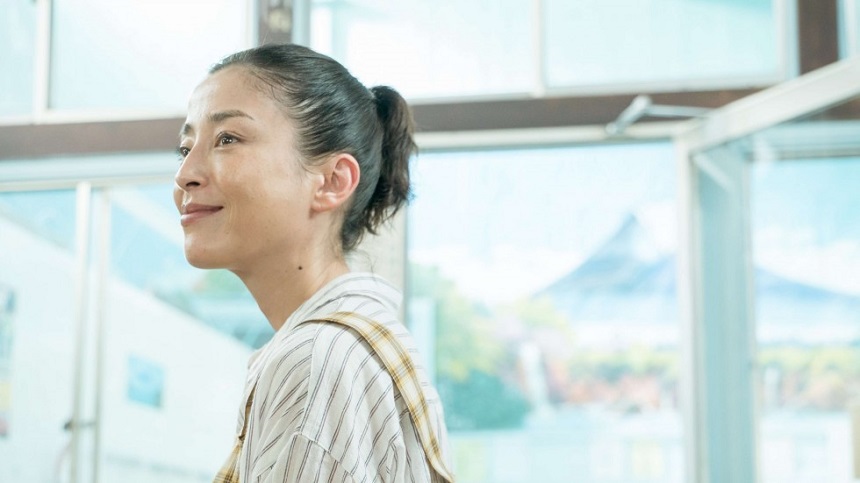Toronto Japanese Fest 2017 Review: HER LOVE BOILS BATHWATER

Futaba (Miyazawa Rie), a strict, but caring single mother, has an awakening when she is told she has an aggressive and terminal cancer that cannot be treated. With only a few months left to live she sets out to reconcile her family and prepare them for her absence. She has to find her husband Kazuhiro (Joe Odagari) who left her and her daughter Azumi a year ago. She has to help Azumi overcome her fears and learn to stand on her own, against bullying at school and prepare for the loss of her mother, her pillar of support all her life. Futaba also wants to reopen the family business, a local bathhouse. Can Futaba brings all the pieces together, with a handful of surprises along the way, and restore her family before her passing?
Preparing to watch Her Love Boils Bathwater (Yu wo wakasuhodo no atsui ai) I already had a sense that this was going to be an emotionally charged experience. Having watched my own mother battle cancer, twice, I knew there would be moments where my eyes would leak uncontrollably. What I was not expecting was it to happen so soon into the story. By the time writer/director Nakano Ryota has introduced his characters and set this family's story in motion we are only twenty minutes into the film and I was already having trouble reading the subtitles through the tears. We had not even gotten to the moment where Futaba discovers she has cancer, for crying out loud. Literally.
Her Love Boils Bathwater is not about Futaba’s discovery of her illness, it is about what she does under the dark cloud of this news. It is about how the family rallies as they learn about her illness and her inevitable passing. It is about family. More than ever, the way a family is comprised isn't always cut and dry. It is more like cut and paste. How deep the fractures in the Kono family go are probably not the norm. Her Love Boils Bathwater has more than it's share of heart stopping moments as Futaba's health degrades and her journey comes to an end. There are still surprises to the end but are exaggerated to stress the point that despite all these fractures and fissions families can strive and survive even the most tragic events.
Wholeheartedly, the story is about the Kono women, mother and daughter, and how they cope with each new discovery along the way. Futaba has to deal with the news about her health and the struggles to bring her family back together. Azumi has to deal with bullying at school and has to find the courage and strength inside herself. Even the young outsider Ayuko has to cope with a new family and the incidents that brought her into this new home the year before. Still. the emotional core of the film is the relationship between Futuba and Azumi and both Miyazawa Rie and Sugisaki Hana are tremendous, pouring out every emotional ounce they can muster without tipping over into melodrama. In fact, it may be strange to see the most recognizable face in the film, Joe Odagari, take a back seat to the women in the film, but I am very okay with that.
With only his second feature film writer/director Nakano Ryota has created an emotionally charged, heart wrenching family drama. What I found time to marvel at, through the tears, is the little things that he does that are so easy to miss. I am positive a second viewing would unveil more, if I could emotionally endure one.
One thing I noticed is that there are moments when Nakano has purposely turned his characters back towards us. Instead of focusing on their faces and expressions we are forced to watch their actions or listen more intently to their conversations, drawing us deeper into each moment. I will point out three moments. Something as simple as Futaba, Azumi and Ayuko preparing for dinner becomes a heartwarming experience because you witness a playfulness growing between the women in the family, young and old. On a girls only road trip Futaba and Ayuko visit an aquarium. Watching a display of jellyfish we only see their silhouettes when after a while Ayuko slowly reaches for Futaba’s hand. Finally, towards the end of the film, Futaba's attorney Takimoto talks to his pre-school daughter about her own mother and most of the conversation takes place with their backs to the camera. Again, our focus is drawn on what he saying to her. These tender moments become magnified because we are focusing selectively on his words and their actions. They are marvelous moments.
Each member of this family has loved, lost, been forgotten or run away. But broken fragments can be pieced together to make something whole again. Anchored by the strength and courage of Futaba she rallies together these broken fragments, these broken souls, and makes a family of it all. She may not be able to rescue herself but by the end, through her failing strength but always strong determination, she rescues more than just her husband and her daughter.
Tissues are highly recommended.

Do you feel this content is inappropriate or infringes upon your rights? Click here to report it, or see our DMCA policy.






